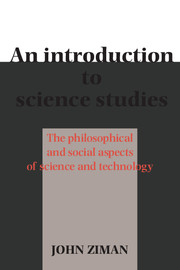Book contents
- Frontmatter
- Contents
- Preface
- 1 ‘Academic’ science
- 2 Research
- 3 Validity
- 4 Communication
- 5 Authority
- 6 Rules and norms
- 7 Change
- 8 The sociology of scientific knowledge
- 9 Science and technology
- 10 Pure and applied science
- 11 Collectivized science
- 12 R & D organizations
- 13 The economics of research
- 14 Science and the State
- 15 The scientist in society
- 16 Science as a cultural resource
- Index
- Frontmatter
- Contents
- Preface
- 1 ‘Academic’ science
- 2 Research
- 3 Validity
- 4 Communication
- 5 Authority
- 6 Rules and norms
- 7 Change
- 8 The sociology of scientific knowledge
- 9 Science and technology
- 10 Pure and applied science
- 11 Collectivized science
- 12 R & D organizations
- 13 The economics of research
- 14 Science and the State
- 15 The scientist in society
- 16 Science as a cultural resource
- Index
Summary
‘I do not know the Game-laws & Patent-laws of science.’
James Clerk MaxwellBehaving as a scientist
Academic science is not formally organized as a whole. It is not governed by a bureaucratic hierarchy, like an army or an industrial firm (§5.6). It does not have a constitution, a charter, or an official book of regulations. In principle, it is simply a community of individuals, each of whom has a permanent tenure of an academic post as a teacher or researcher. To adopt traditional political metaphors, academic scientists are like free citizens of a democratic republic of learning, or like a community of farmers, each secure on his own holding.
And yet this community is not a mere collection of individuals. Although it does not have an overall organizational plan, it is structured around a number of formal institutions, such as learned societies, and informal institutions, such as invisible colleges. It is spanned by an elaborate communication system which follows standard practices in the management of publications and archives, regulates the roles of authors, editors, and referees, and has strict conventions on the style and format of papers (§4.5). The procedures by which scientists are ‘recognized’ (§5.1) are less systematic, but are just as elaborate.
- Type
- Chapter
- Information
- An Introduction to Science StudiesThe Philosophical and Social Aspects of Science and Technology, pp. 81 - 90Publisher: Cambridge University PressPrint publication year: 1984



